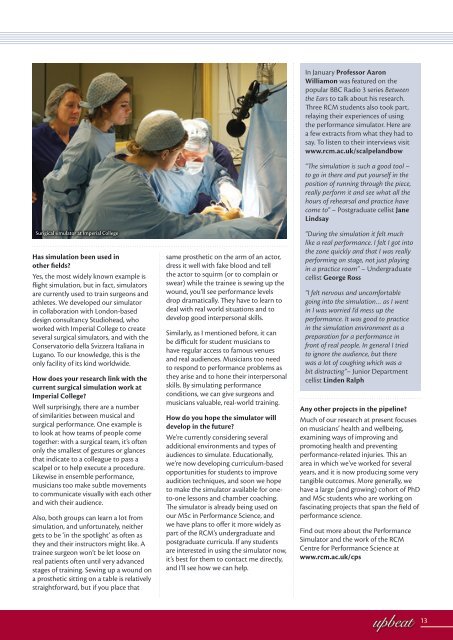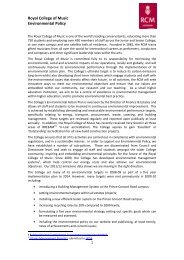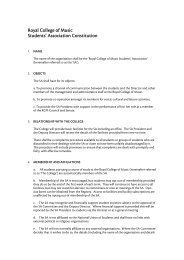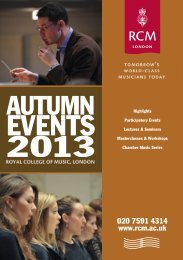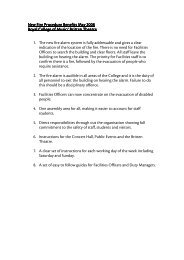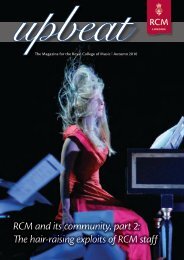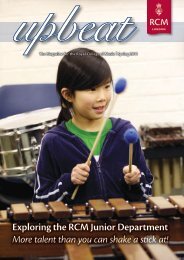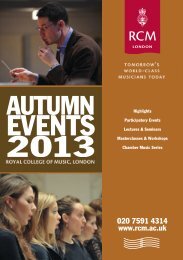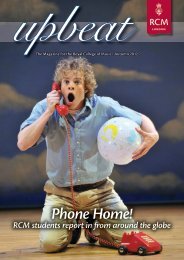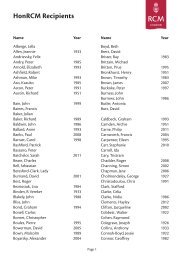Upbeat Spring 2013 - Royal College of Music
Upbeat Spring 2013 - Royal College of Music
Upbeat Spring 2013 - Royal College of Music
Create successful ePaper yourself
Turn your PDF publications into a flip-book with our unique Google optimized e-Paper software.
Surigical simulator at Imperial <strong>College</strong><br />
Has simulation been used in<br />
other fields?<br />
Yes, the most widely known example is<br />
flight simulation, but in fact, simulators<br />
are currently used to train surgeons and<br />
athletes. We developed our simulator<br />
in collaboration with London-based<br />
design consultancy Studiohead, who<br />
worked with Imperial <strong>College</strong> to create<br />
several surgical simulators, and with the<br />
Conservatorio della Svizzera Italiana in<br />
Lugano. To our knowledge, this is the<br />
only facility <strong>of</strong> its kind worldwide.<br />
How does your research link with the<br />
current surgical simulation work at<br />
Imperial <strong>College</strong>?<br />
Well surprisingly, there are a number<br />
<strong>of</strong> similarities between musical and<br />
surgical performance. One example is<br />
to look at how teams <strong>of</strong> people come<br />
together: with a surgical team, it’s <strong>of</strong>ten<br />
only the smallest <strong>of</strong> gestures or glances<br />
that indicate to a colleague to pass a<br />
scalpel or to help execute a procedure.<br />
Likewise in ensemble performance,<br />
musicians too make subtle movements<br />
to communicate visually with each other<br />
and with their audience.<br />
Also, both groups can learn a lot from<br />
simulation, and unfortunately, neither<br />
gets to be ‘in the spotlight’ as <strong>of</strong>ten as<br />
they and their instructors might like. A<br />
trainee surgeon won’t be let loose on<br />
real patients <strong>of</strong>ten until very advanced<br />
stages <strong>of</strong> training. Sewing up a wound on<br />
a prosthetic sitting on a table is relatively<br />
straightforward, but if you place that<br />
same prosthetic on the arm <strong>of</strong> an actor,<br />
dress it well with fake blood and tell<br />
the actor to squirm (or to complain or<br />
swear) while the trainee is sewing up the<br />
wound, you’ll see performance levels<br />
drop dramatically. They have to learn to<br />
deal with real world situations and to<br />
develop good interpersonal skills.<br />
Similarly, as I mentioned before, it can<br />
be difficult for student musicians to<br />
have regular access to famous venues<br />
and real audiences. <strong>Music</strong>ians too need<br />
to respond to performance problems as<br />
they arise and to hone their interpersonal<br />
skills. By simulating performance<br />
conditions, we can give surgeons and<br />
musicians valuable, real-world training.<br />
How do you hope the simulator will<br />
develop in the future?<br />
We’re currently considering several<br />
additional environments and types <strong>of</strong><br />
audiences to simulate. Educationally,<br />
we’re now developing curriculum-based<br />
opportunities for students to improve<br />
audition techniques, and soon we hope<br />
to make the simulator available for oneto-one<br />
lessons and chamber coaching.<br />
The simulator is already being used on<br />
our MSc in Performance Science, and<br />
we have plans to <strong>of</strong>fer it more widely as<br />
part <strong>of</strong> the RCM’s undergraduate and<br />
postgraduate curricula. If any students<br />
are interested in using the simulator now,<br />
it’s best for them to contact me directly,<br />
and I’ll see how we can help.<br />
In January Pr<strong>of</strong>essor Aaron<br />
Williamon was featured on the<br />
popular BBC Radio 3 series Between<br />
the Ears to talk about his research.<br />
Three RCM students also took part,<br />
relaying their experiences <strong>of</strong> using<br />
the performance simulator. Here are<br />
a few extracts from what they had to<br />
say. To listen to their interviews visit<br />
www.rcm.ac.uk/scalpelandbow<br />
“The simulation is such a good tool –<br />
to go in there and put yourself in the<br />
position <strong>of</strong> running through the piece,<br />
really perform it and see what all the<br />
hours <strong>of</strong> rehearsal and practice have<br />
come to” – Postgraduate cellist Jane<br />
Lindsay<br />
“During the simulation it felt much<br />
like a real performance. I felt I got into<br />
the zone quickly and that I was really<br />
performing on stage, not just playing<br />
in a practice room” – Undergraduate<br />
cellist George Ross<br />
“I felt nervous and uncomfortable<br />
going into the simulation… as I went<br />
in I was worried I’d mess up the<br />
performance. It was good to practice<br />
in the simulation environment as a<br />
preparation for a performance in<br />
front <strong>of</strong> real people. In general I tried<br />
to ignore the audience, but there<br />
was a lot <strong>of</strong> coughing which was a<br />
bit distracting”– Junior Department<br />
cellist Linden Ralph<br />
Any other projects in the pipeline?<br />
Much <strong>of</strong> our research at present focuses<br />
on musicians’ health and wellbeing,<br />
examining ways <strong>of</strong> improving and<br />
promoting health and preventing<br />
performance-related injuries. This an<br />
area in which we’ve worked for several<br />
years, and it is now producing some very<br />
tangible outcomes. More generally, we<br />
have a large (and growing) cohort <strong>of</strong> PhD<br />
and MSc students who are working on<br />
fascinating projects that span the field <strong>of</strong><br />
performance science.<br />
Find out more about the Performance<br />
Simulator and the work <strong>of</strong> the RCM<br />
Centre for Performance Science at<br />
www.rcm.ac.uk/cps<br />
13


